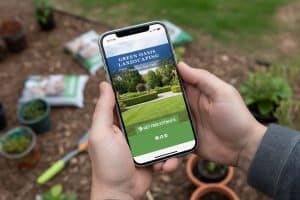

You’ll want to focus on five game-changing marketing technologies for your landscaping business. AI-powered customer service solutions can reduce response times while boosting client retention. Virtual landscape design tools with 3D modeling cut pricing errors and accelerate approvals. Social media automation saves countless hours weekly through scheduled content delivery. Data analytics help predict seasonal demands and identify upsell opportunities. Mobile client management apps provide 24/7 service access and real-time updates. These tech investments deliver measurable ROI and position your business at the forefront of industry innovation.
Key Takeaways
- Virtual landscape design tools with 3D modeling create immersive client presentations and reduce the sales cycle through realistic visualizations.
- AI-powered chatbots provide 24/7 customer support, handle routine inquiries, and improve response times.
- Social media automation tools schedule content strategically and save time while maintaining an effective promotional-educational content balance.
- Mobile client management apps offer real-time job tracking, payment processing, and service history access through customer portals.
- Data analytics platforms provide actionable insights about customer preferences and help forecast seasonal demands for targeted marketing.
AI-Powered Customer Service Solutions
Three powerful AI-driven customer service solutions are transforming how landscaping businesses interact with clients. The first is chatbot integration, which enables your business to provide 24/7 customer support, handling routine inquiries about pricing, scheduling, and service availability. These AI chatbots can process multiple customer conversations simultaneously, reducing response times.
The second solution involves AI-powered scheduling systems that analyze your crew availability, weather patterns, and client preferences to optimize appointment booking. You’ll reduce scheduling conflicts while maximizing your team’s productivity, leading to an increase in operational efficiency.
The third advancement focuses on creating personalized experiences through AI-driven customer analysis. By processing client data, including property specifications, service history, and communication preferences, you can deliver tailored recommendations and maintenance schedules. This technology tracks patterns in customer behavior, enabling you to anticipate needs and proactively address concerns. Research shows that landscaping businesses implementing these AI solutions experience an increase in customer satisfaction scores and a significant boost in client retention rates. You’ll also benefit from reduced administrative costs while maintaining a more consistent and professional customer service presence.
Virtual Landscape Design Tools
Modern virtual landscape design tools represent a game-changing advancement in how landscaping businesses visualize and present projects to clients. With sophisticated 3D modeling capabilities, you’ll transform traditional sketches into immersive digital experiences that showcase your creative vision with precision and detail.
These virtual tools enable you to streamline client presentations by offering:
- Real-time design modifications during meetings, allowing instant adjustments to plant selections, hardscape materials, and layout configurations
- Accurate cost estimates based on exact measurements and material quantities, reducing pricing errors
- Photo-realistic renderings that demonstrate seasonal changes, lighting effects, and mature growth projections
You’ll find that implementing virtual landscape design tools can greatly reduce the sales cycle length, as clients can better understand and approve designs faster. The technology integrates seamlessly with existing project management systems, enabling you to export material lists, construction documents, and installation guides directly from your 3D models. By leveraging these tools, you’ll position your business at the forefront of industry innovation while delivering superior client experiences that drive higher conversion rates.
Social Media Marketing Automation
Through the power of automation, social media marketing has become an indispensable tool for landscaping businesses seeking to scale their digital presence. By implementing automated solutions, you’ll streamline your social media workflow while maintaining consistent engagement with your target audience.
Social media scheduling platforms like Hootsuite, Buffer, or Sprout Social enable you to plan and schedule posts weeks in advance, ensuring your content reaches followers at ideal times. You can showcase before-and-after transformations, seasonal maintenance tips, and project highlights without manually posting each day.
Content curation tools help you identify and share relevant industry news, gardening tips, and landscaping trends that resonate with your audience. These platforms analyze engagement metrics, allowing you to refine your content strategy based on data-driven insights. You’ll save numerous hours per week by automating repetitive tasks like post scheduling, hashtag research, and performance tracking.
To maximize your automation efforts, focus on creating a balanced content mix: 40% promotional content, 40% educational material, and 20% community engagement. This approach helps maintain authentic connections while leveraging technology to expand your reach and convert followers into clients.
Data Analytics and Client Tracking
Successful landscaping businesses leverage data analytics tools to transform client interactions into actionable insights. By implementing robust tracking systems, you’ll gain valuable data about customer preferences, service patterns, and seasonal demands. These insights enable you to make informed decisions about resource allocation and marketing strategies.
Customer segmentation becomes more precise when you utilize modern analytics platforms. You’ll be able to categorize clients based on property size, service frequency, and spending patterns. Predictive analytics helps forecast seasonal demands and identify potential upsell opportunities within your existing client base.
To maximize your data analytics efforts, focus on these key metrics:
- Client retention rates and lifetime value calculations to identify your most profitable customer segments
- Service request patterns and response times to optimize crew scheduling and route planning
- Historical weather data correlation with service demands to predict seasonal workflow
Mobile Apps for Client Management
Building on your data analytics infrastructure, mobile apps offer a streamlined way to manage client relationships in real-time. These platforms integrate client communication and project scheduling into a single interface, allowing your team to respond promptly to service requests and maintain detailed job histories.
| Feature | Benefit | Implementation |
| Client Portal | 24/7 service access | Enable client login |
| Job Tracking | Real-time updates | GPS integration |
| Payment Processing | Faster transactions | Payment gateway setup |
| Service History | Data-driven decisions | Cloud database sync |
You’ll find that mobile apps create efficiency through automated appointment reminders, digital invoicing, and instant messaging capabilities. Your crews can access property maps, client preferences, and service specifications directly from their devices, reducing miscommunication and improving service delivery.
To maximize ROI, select apps that offer customizable features aligned with your specific business model. Look for solutions that provide robust reporting tools and integrate with your existing customer relationship management (CRM) system. Consider apps that support offline functionality for areas with limited connectivity, ensuring uninterrupted service documentation and client communication in the field.
Frequently Asked Questions
How Much Does It Cost to Implement Emerging Marketing Technologies?
You’ll need to budget $5,000-25,000 annually for emerging marketing tech implementation. Your cost analysis should factor in software licenses, training, maintenance, and potential ROI when developing budgeting strategies.
What Cybersecurity Measures Protect Landscaping Business Data and Client Information?
Like a fortress protecting your assets, you’ll need robust data encryption for client records, regular security audits, secure password protocols, and updated firewalls to safeguard your landscaping business’s sensitive information.
How Long Does Staff Training Typically Take for New Marketing Technologies?
You’ll typically need 2-4 weeks for basic marketing tech training, though staff adaptability varies. Plan for 1-2 months of hands-on practice before expecting full proficiency with new digital tools.
Embrace the Future of Landscaping with Cutting-Edge Marketing Tech
Don’t let your competition leave you in the dust. The landscaping industry is evolving rapidly, and staying ahead means leveraging the latest marketing technologies. By integrating AI-powered customer service, virtual design tools, automated social media management, advanced analytics platforms, and mobile apps into your business, you’ll streamline operations, enhance client experiences, and position your company for data-driven growth in today’s competitive market.
By adopting these technologies now, you’ll not only improve client satisfaction but also position your business for sustainable growth in an increasingly digital landscape market.
Contact Lawn Launch Digital today for a free tech assessment and watch your business flourish!



